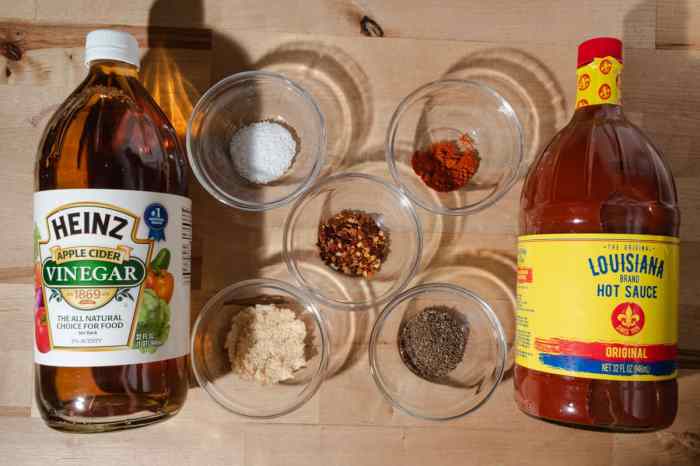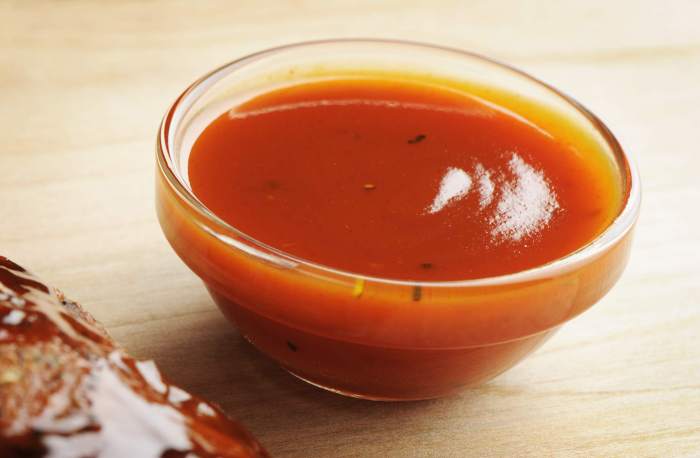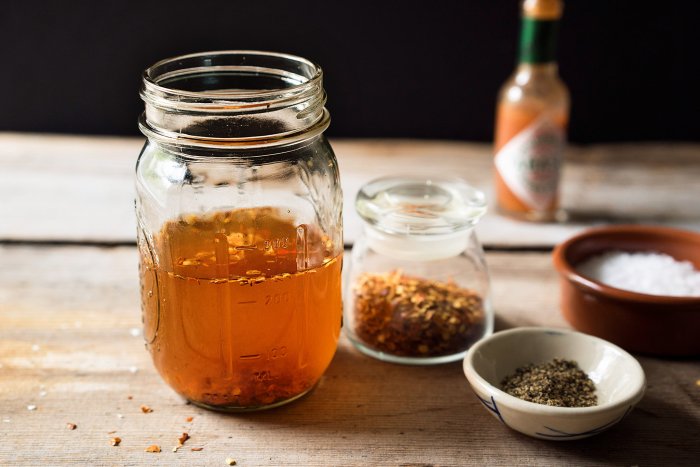Eastern Carolina Vinegar BBQ Sauce Recipe
Eastern Carolina Vinegar BBQ Sauce

Source: mandiofthemountains.com
Eastern carolina vinegar bbq sauce recipe – Eastern Carolina vinegar-based barbecue sauce stands apart from other regional styles with its sharp, tangy flavor profile. Its simplicity belies a rich history and a unique place in American culinary tradition. This article will explore the defining characteristics of this sauce, provide a recipe with variations, detail preparation methods, and offer serving suggestions and customization ideas.
The tangy simplicity of Eastern Carolina vinegar BBQ sauce is a hallmark of the region’s culinary heritage. Its sharp flavor profile contrasts beautifully with sweeter options, and considering the balance of flavors, it’s interesting to compare it to the sweetness found in a dried cherry cranberry sauce recipe. The complexity of the cranberry sauce, while different, highlights how diverse yet complementary flavor profiles can be within the realm of sauces.
Returning to the BBQ sauce, the vinegar’s acidity is key to its distinct character.
Defining Eastern Carolina Vinegar BBQ Sauce, Eastern carolina vinegar bbq sauce recipe
Eastern Carolina vinegar BBQ sauce is characterized by its intensely acidic and subtly sweet flavor profile. Unlike the tomato-based sauces of Kansas City or the mustard-based sauces of South Carolina, this sauce relies heavily on vinegar, often a combination of apple cider and white vinegar, for its tartness. A touch of sweetness, typically from brown sugar or honey, balances the acidity, while spices like black pepper and red pepper flakes provide a gentle warmth.
Its origins trace back to the eastern part of North Carolina, where the readily available ingredients and the preference for a simpler, less sweet sauce shaped its development. Regional variations exist, with some recipes incorporating a touch of ketchup or Worcestershire sauce, while others remain strictly vinegar-based. The key ingredients—vinegar, sugar, and spices—distinguish it from other styles. While some recipes might include a tiny amount of tomato paste for thickening, it remains a distinctly vinegar-forward experience.
Compared to South Carolina’s mustard-based sauces, which offer a creamy, mustardy pungency, and Kansas City’s tomato-based sauces, known for their rich, smoky sweetness, Eastern Carolina vinegar sauce is lighter, brighter, and more acidic. It’s a stark contrast, emphasizing the natural flavors of the meat rather than masking them with a heavy sauce.
Recipe Variations and Ingredients

Source: thespruceeats.com
The beauty of Eastern Carolina vinegar BBQ sauce lies in its adaptability. A basic recipe forms the foundation, but variations allow for personalized flavor profiles. The quality of ingredients significantly impacts the final product. Using high-quality vinegar, for example, results in a brighter, more nuanced flavor.
Here’s a basic recipe, followed by three variations:
Basic Recipe:
- 1 cup apple cider vinegar
- 1/2 cup white vinegar
- 1/4 cup brown sugar
- 2 tablespoons black pepper
- 1 teaspoon red pepper flakes (optional)
Variations:
- Spicier: Increase red pepper flakes to 2 teaspoons, and add a pinch of cayenne pepper.
- Sweeter: Increase brown sugar to 1/3 cup, and consider adding a tablespoon of honey.
- Tangier: Increase the amount of white vinegar to 3/4 cup, and reduce the brown sugar slightly.
The role of each ingredient is crucial: vinegar provides the tartness, sugar balances the acidity, and spices add warmth and complexity. Using high-quality ingredients ensures a superior taste.
| Vinegar Type | Flavor Profile Effect |
|---|---|
| Apple Cider Vinegar | Subtle sweetness and fruity notes, balances acidity |
| White Vinegar | Sharp, clean acidity, provides brightness |
| White Wine Vinegar | More delicate acidity than white vinegar, adds a subtle fruitiness |
Preparation and Cooking Methods
Making Eastern Carolina vinegar BBQ sauce is straightforward. Both stovetop and slow cooker methods yield excellent results.
- Combine all ingredients in a saucepan.
- Bring to a simmer over medium heat.
- Reduce heat to low and simmer for 15-20 minutes, stirring occasionally, until slightly thickened.
- Remove from heat and let cool completely.
Visual Representation (Text-Based):
1. Ingredients combined in saucepan. 2. Sauce simmering gently on stovetop. 3.
Finished sauce, slightly thickened and ready to cool.
Equipment:
- Saucepan
- Whisk
Serving and Applications

Source: nytimes.com
Eastern Carolina vinegar BBQ sauce pairs beautifully with pulled pork, chicken, and ribs. Its bright acidity cuts through the richness of the meat, enhancing its flavor. Beyond traditional barbecue, it can be used as a marinade for chicken or fish, a tangy addition to coleslaw, or even a unique salad dressing.
| Serving Suggestion | Accompanying Food Item | Visual Appeal Description |
|---|---|---|
| Drizzled over pulled pork | Pulled pork sandwich on a brioche bun | The glossy, dark sauce contrasts beautifully with the pale bun and pulled pork, creating a visually appealing and appetizing presentation. |
| Used as a marinade for chicken | Grilled chicken breast | The sauce glazes the chicken, giving it a rich, dark color and a shiny surface. |
Flavor Enhancement and Customization
Numerous flavor pairings complement Eastern Carolina vinegar BBQ sauce. For example, smoky paprika adds depth, while a touch of liquid smoke enhances the smoky notes. To adjust the spiciness, simply add more or less red pepper flakes or cayenne pepper. Experimenting with different vinegars (e.g., rice vinegar for a subtler acidity) or adding herbs like thyme or rosemary can create unique flavor profiles.
Optional Additions:
- Smoked paprika
- Liquid smoke
- Garlic powder
- Onion powder
FAQ Guide: Eastern Carolina Vinegar Bbq Sauce Recipe
Can I use this sauce on anything besides barbecue?
Absolutely! It’s fantastic as a marinade for chicken or pork, a glaze for roasted vegetables, or even a surprisingly delicious salad dressing.
How long does the sauce last?
Properly stored in an airtight container in the refrigerator, it should last for about a week.
What if I don’t have apple cider vinegar?
White vinegar is a suitable substitute, though it will result in a slightly sharper flavor. You could also experiment with rice vinegar for a different nuance.
Can I make this sauce ahead of time?
Yes, the flavor actually improves with time. Making it a day or two in advance allows the flavors to meld beautifully.





















